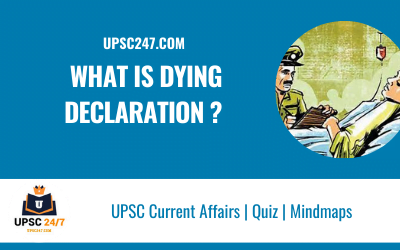What Is a Dying Declaration ? | UPSC | Expalined | Why In The News ?
News : A special CBI court convicted two policemen and awarded them life sentences for the custodial death of a murder accused who was burnt alive inside a police station. The judgment relied heavily on the ‘dying declaration’ made by the victim prior to his death.
What is the Dying Declaration?
“When the party is at the point of death and when every hope of this world is gone, when every motive to falsehood is silenced, and the mind is induced by the most powerful considerations to speak the truth; a situation so solemn and so lawful is considered by the law as creating an obligation equal to that which is imposed by a positive oath administered in a Court of justice.”
- The Dying Declarations is the statement of a person who had died explaining the circumstances of his death.
- A dying declaration is considered credible and trustworthy evidence, based upon the general belief that most people who know that they are about to die, do not lie.
- Section 32 of the Indian Evidence Act deals with the cases related to that person who is dead or who cannot be found.

Who can record dying declarations?
- Anyone can record the dying declarations of the deceased as per law.
- The law does not compulsorily require the presence of a Judicial or Executive Magistrate to record a dying declaration.
- A dying declaration recorded by a Judicial or Executive Magistrate will muster additional strength to the prosecution case though.
- A dying declaration may in several cases be the “primary piece of evidence to prove the genesis of occurrence.
- The only requirement for such a declaration to be held perfectly accountable in court is for the victim to volunteer the statement and be of conscious mind.
- The person who records the dying declarations must be satisfied that the victim is in a fit state of mind.
Read Also : Essential Defence Services Bill 2021 | UPSC
Do dying declarations always need corroboration?
- A dying declarations can form the sole basis of conviction.
- The rule requiring corroboration is merely a rule of prudence.
- Several judgments have noted that it is neither rule of law nor prudence that a dying declarations cannot be acted upon without corroboration.
- If the court is satisfied that the dying declaration is true and voluntary, it can base conviction on it, without corroboration.
- But the court has to scrutinise the dying declarations carefully and must ensure that the declaration is not the result of tutoring, prompting, or imagination.
Source : Indian Express







